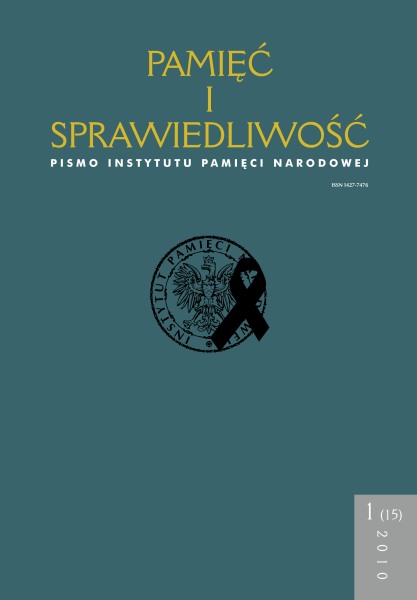Współpraca środowiska „Spotkań” z emigracją na Zachodzie. Przyczynek do badań
Pamięć i Sprawiedliwość, Том 15 № 1 (2010), pages: 187-210
Publication date: 2010-06-30
Аннотация
Opposition in Poland in the seventies and eighties and emigration environments in the West were connected by multifarious relations. Historical and political emigration literature was one of the elements that formed the opinions of opposition activists in the country. Emigration press was a forum of opinion
exchange for them before the independent publishing movement came into being. Since the middle of the seventies, emigration financially supported the opposition in Poland and was the main proponent of its interests in the West.
The environment of the independent paper “Spotkania” presents the relations between the emigration and opposition in the country well. The paper came out between 1977–1988 in Lublin. One of the papers’ initiators was Piotr Jegliński who has lived in Paris since 1974. In 1978, he established there a “twin” publishing
house – Editions Spotkania, which reedited the paper.
During the whole period in which the paper “Spotkania” was published, the main source of financing was the help from the West. Its organiser was Jegliński and the donors were private persons, Polish foundations and also subjects financed by the governmental institutions in the West.
Jegliński made many contacts with associations, institutions and private persons who had influence on public opinion in the West. He conducted information and lobbying activities – as, especially after the introduction of martial law in Poland, it was essential to publicise the problem of political repression in Poland, to obtain financial support for victims and to obtain the support of the West for the opposition activity in the country. Jedliński organised propaganda campaigns and happenings together with other circles of Polish emigrants in Paris, among others, the group of people concentrated around the paper “Kontakt” (“Contact”),
which was published in Paris.
In the eighties, it was essential to maintain social resistance in the country. On Jegliński’s initiative, among others, thousands of miniature publications from his and other emigree publishing houses reached Poland. The environment of “Spotkania” appreciated the enormous informative role played by Radio Free Europe. Over the years, Jegliński and an emigrant Jan Stepek, the editor of “Spotkania”, cooperated with RFE.
The goal of the paper “Spotkania” was similar to the one of the Parisian paper “Kultura” (“Culture”). Since the first edition of the paper, editors and journalists stressed the importance of reconciliation and cooperation of nations in the Central-Eastern Europe. The paper also opened its columns to representatives of
the Russian and Ukrainian emigration.
Наиболее читаемые статьи этого автора (авторов)
- Adam Burakowski, Antoni Dudek, Paweł Ukielski, Małgorzata Choma-Jusińska, [Dyskusja] Rok 1989 w państwach Europy Środkowej. Dyskusja z udziałem Adama Burakowskiego , Pamięć i Sprawiedliwość: Том 18 № 2 (2011)
- Małgorzata Choma-Jusińska, Rola duszpasterstwa akademickiego o. Ludwika Wiśniewskiego w działalności opozycji przedsolidarnościowej w Lublinie , Pamięć i Sprawiedliwość: Том 7 № 1 (2005)
- Małgorzata Choma-Jusińska, Sprawozdanie pokontrolne z pracy Wydziału IV Wojewódzkiego Urzędu Spraw Wewnętrznych w Lublinie w 1988 roku , Pamięć i Sprawiedliwość: Том 7 № 1 (2005)
 Język Polski
Język Polski
 English
English
 Deutsch
Deutsch
 Français (France)
Français (France)
 Italiano
Italiano
 Русский
Русский


 PDF (Język Polski)
PDF (Język Polski)
